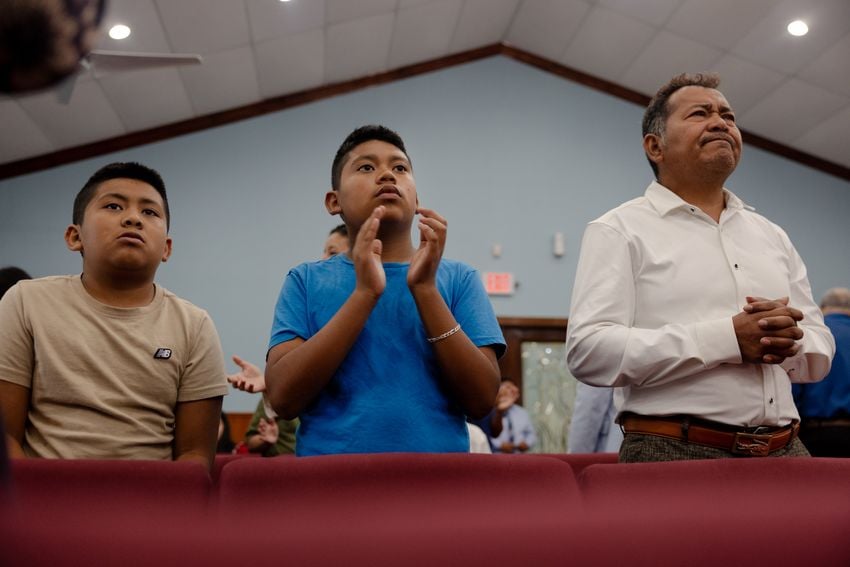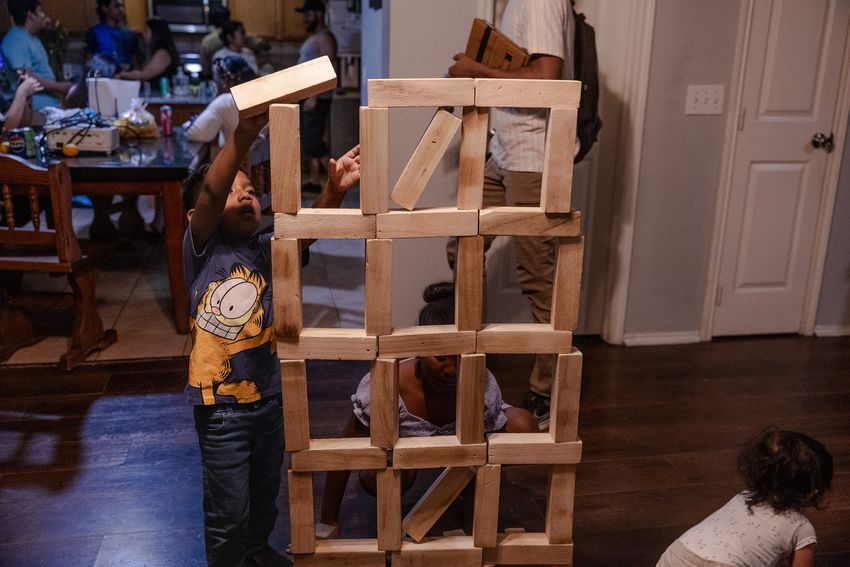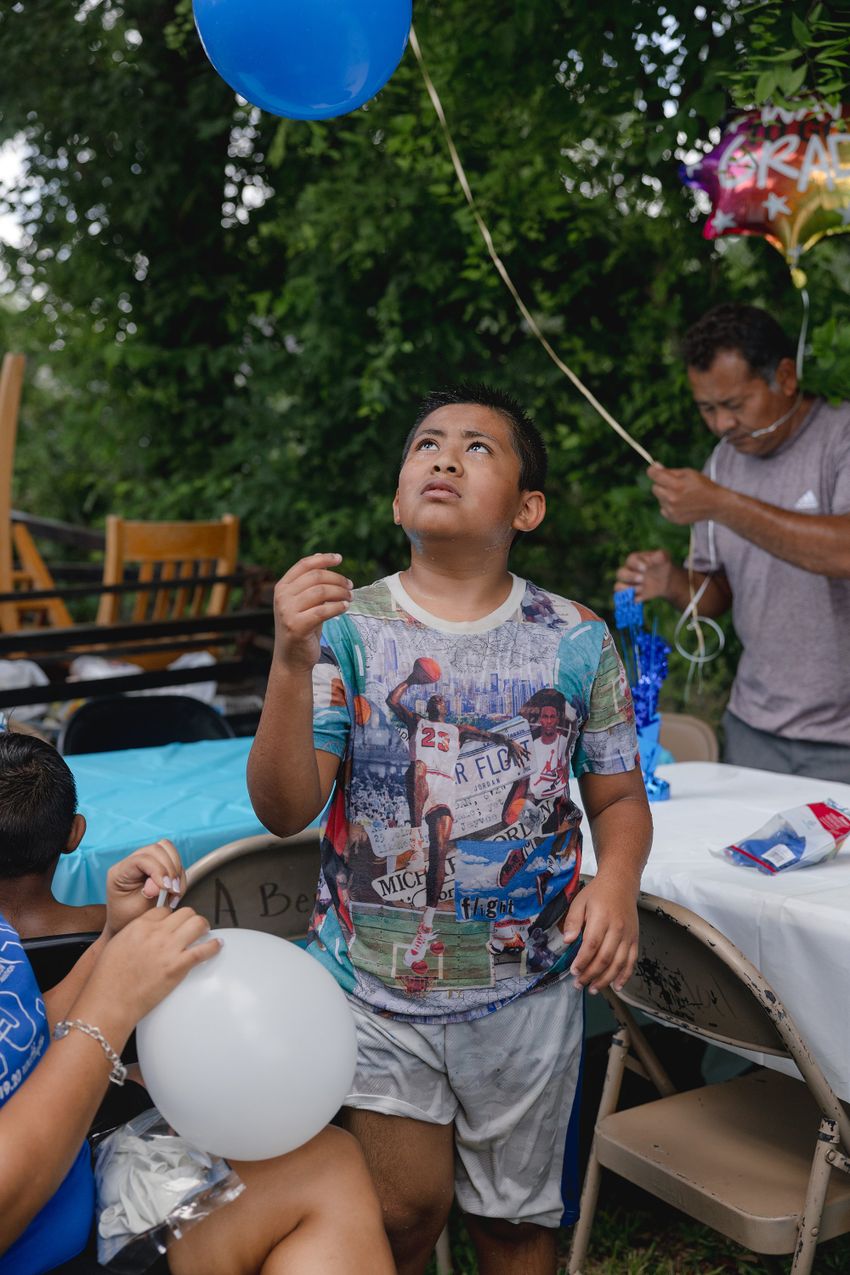
A Houston mother held by ICE must choose: indefinite detention or be deported without her family
Sign up for The Brief, The Texas Tribune’s daily newsletter that keeps readers up to speed on the most essential Texas news.
HOUSTON — At a Pentecostal church in a shopping center just north of the city, the pastor called the children toward the pulpit for a Mother’s Day blessing. Brothers Isaac, 12, and Jeremiah Avila, 10, stepped forward holding cards they made for their mother, Margarita.
Their smiles vanished as the mothers approached to hug and kiss their children — no one came for them.
Seeing their faces, the oldest sister, Lisbet Avila, swept in to escort the boys back to their seats. Next to them, their father, José Avila, 54, kneeled as if to pray, but instead cried into his hands. Isaac pulled his button-down shirt over his face, hiding his red, tear-stained eyes.
Jeremiah crumpled his card, which bore a note written in Spanish in his child’s scrawl: “Mother, I love you, and thank you for having me.” He leaned against his other sister, 27-year-old Ester Avila, who hugged him as she wiped her tears away.
It was the first time any of them could remember Margarita missing a Mother’s Day. She had been sitting in a cell in an immigrant detention center since March as the Trump administration was preparing to deport her to Belize, where she left two decades ago because of threats to her family.
“It’s really hard to see everything my wife is going through,” José said. “It hurts not being able to be with my wife — and seeing my kids sad — because their mother is always around.”
/https://static.texastribune.org/media/files/8947185af26081a8e6d34d9531ebb7e9/Margarita%20Avila%20Courtesy%20TT%2001.jpg)
Margarita Avila, 50, is among the tens of thousands of immigrants in the U.S. targeted for deportation in President Donald Trump’s second term. Trump has said his administration is going after “the worst of the worst” in an attempt to deport 1 million immigrants annually. But six months into Trump’s second administration, at least 70% of the more than 56,000 immigrants detained across the country didn’t have a criminal record, according to the Transactional Records Access Clearinghouse, a nonprofit that collects and analyzes federal government data.
Margarita requested asylum in the U.S. more than a decade ago and her case has been pending ever since. Meanwhile, she and José have grown their family in Texas, and like many other immigrants, they have put down deep roots. They bought a house in Houston’s Independence Heights neighborhood, started a landscaping business that grew to hundreds of customers, and had five U.S.-born sons who are American citizens.
This site is protected by reCAPTCHA and the Google Privacy Policy and Terms of Service apply.
But on March 12, their fortunes changed.
According to a police report, Margarita was cutting weeds in a residential area in Spring, about 10 feet from a postal worker who was delivering to a community mailbox and asked Margarita to turn off the weed eater until she finished.
Margarita couldn’t hear her over the machine, the police report says, so the postal worker yelled to get her attention. The worker, who claimed Margarita hit her with the weed eater, called the police. When Margarita produced a Belize identification card, the deputy took her to jail on suspicion of assault — a charge that was later dropped. But it was too late — within a day, U.S. Immigration and Customs Enforcement plucked her from the Harris County Jail.
As her family celebrated Mother’s Day without her, Margarita pondered whether to fight her deportation order and stay in the detention center cell for months, or sign her voluntary deportation papers and be sent thousands of miles away from her children and husband.
Because of their various immigration statuses — some undocumented, some pending asylum, some U.S. citizens — Margarita’s deportation would make it difficult and in some cases impossible to see her close-knit family. Her husband would have to decide whether to stay in the U.S. with their two youngest children or follow his wife to Belize so they can raise the boys together in a country Isaac and Jeremiah have never known. For the oldest children born in Belize, it could mean not seeing their mother for years because they don’t have permanent legal status.
“I feel like I’m in a lose-lose situation because if she’s deported, I can’t visit her because I wouldn’t be able to come back,” said Lisbet, 31, who has three children and can’t easily travel outside of the U.S. because of her temporary protected status under the Deferred Action for Childhood Arrivals program. “I have my own family here to think about.”
/https://static.texastribune.org/media/files/79088d32b0dd5b8e98ccf5279aa481b4/0530%20Avila%20Deportation%20LP%20TT%20008.jpg)

/https://static.texastribune.org/media/files/3f461b0a6f072241439c8d034681ab17/0530%20Avila%20Deportation%20LP%20TT%2010.jpg)
At the same time, the conditions in the detention center were eroding Margarita’s will. The watery, undercooked food sometimes smelled rotten, she said, and she was only given Advil for the pain that emerged in her belly. She later learned it was Hepatitis B, a viral infection affecting the liver that she suspects she contracted in the detention center. A spokesperson for the holding facility did not provide a comment by deadline.
“The medical treatment was so bad that there were two days when I couldn’t even get out of bed,” Margarita said, recounting one week when she had a fever and began vomiting. After three days the staff sent her to a hospital for treatment before returning her to a cell.
David Paz, Margarita’s immigration lawyer, said that before Trump returned to office, a situation like Margarita’s — a minor criminal charge that was later dropped — would typically lead to release from ICE custody, Paz said. But not anymore.
“It’s become harder to help people in her situation,” Paz said from his downtown Houston office.
An American dream
José remembers when he first saw Margarita. He was 16, she was 13.
“She was very beautiful,” José said. “Not just was, but is still beautiful.”
He was drawn to her sincerity and how close she was with her family. She lived next door to his family in Belize. They dated for four years before marrying. He told her he wanted to have 12 children, and they soon had four: Lisbet, Abigail, Ester and José Jr.
José supported them by working as a fisherman, maintaining an agricultural jet and importing snacks such as chips and cookies from Mexico, selling them to local businesses and street vendors. During his travels, he had left the Catholic Church for Pentecostalism, and he launched a church in their town.
In 1998, the family went to a nearby lake for an outing, and one of Margarita’s cousins began playing too roughly with the Avila daughters. When José stepped in to defend the girls, he said the argument turned into a physical fight that ended with José whacking the cousin across the head with a boat paddle.
The cousin didn’t forget the humiliation, and when he later joined a local gang, José and Margarita began receiving notes threatening to kill them.
Later that year, the Avilas fled the country for their safety and applied for tourist visas in the U.S., settling in Houston. José began to work for a landscaping company and bought a house. When their visas expired, the Avilas stayed in Texas.
The family kept growing. Eliseo was the first child born in the U.S. Then came Elias and David.
In 2012, José was in a car accident, and because he didn’t have a driver’s license, he was arrested and eventually deported. Margarita and the children — except for Lisbet, who was 18 and taking care of her firstborn— returned to Belize to reunite with José, who went back to Margarita’s hometown.
At first, everything seemed peaceful. But one day, someone delivered a note to their house demanding $10,000 — and threatening to kidnap one of their daughters if they didn’t pay. Six months after they had returned to Belize, José traveled through Central America and Mexico and crossed the Texas-Mexico border in the Rio Grande Valley, where he surrendered and requested asylum.
When José told a judge that he’d be harmed or killed if he returned to Belize, the judge rejected his asylum request but granted him withholding of removal, which prevents the U.S. government from deporting someone to a home country where they could face persecution or torture.
José couldn’t get a green card or apply for U.S. citizenship, but the new status let him get a work permit as long as he checked with ICE agents once a year.
José then sent for his wife and children, who made the same journey and turned themselves into U.S. Border Patrol agents in the Rio Grande Valley and requested asylum as well. Margarita received a deportation order for entering the country illegally, but the U.S. government granted her and the children humanitarian parole, allowing them to live in the U.S. until their asylum cases were settled.
José was waiting for his family on the U.S. side. The first meal they got after being released was at a McDonald’s, he said.
“I just remember my kids' faces being so happy to be back,” José said.
Planting roots
After reuniting, Margarita and José lived in New York, where Isaac was born, but soon returned to Houston. There, they opened a landscaping business and returned to their home they had bought years earlier. Feeling safe and settled again, they had another child, Jeremiah.
The oldest children worked with them, mowing lawns and helping them communicate with their English-speaking clients during summer breaks from school.
“It was hard work,” said their daughter Ester. “As children, we didn’t want to work, but we knew we had to help out.”
The older children started their own families. Lisbet, Abigail and Ester also started their own landscaping businesses with their father's blessing and guidance.
In their big mixed-status family, the threat of deportation was always there for the older members of the family: Lisbet applied and received Deferred Action for Childhood Arrivals — also known as DACA — an Obama administration program that provides some young undocumented immigrants, who came to the U.S. as children, work permits and temporary protection from deportation.
/https://static.texastribune.org/media/files/5db458e968910cec1949b3730bd8af75/0523%20Avila%20Deportation%20LP%20TT%2001.jpg)
/https://static.texastribune.org/media/files/8e253b5e7a5df7a984b3c31f45e5cb69/0524%20Avila%20Deportation%20LP%20TT%2009.jpg)
/https://static.texastribune.org/media/files/ea54054d8c905b9cc5c31ba6ecaeb34e/0523%20Avila%20Deportation%20LP%20TT%20105.jpg)
Abigail married Oscar, another DACA recipient who came to the U.S. from Mexico with his family when he was a year old. Ester married her high-school sweetheart, Isaias, an immigrant from Honduras, who came to Houston without papers to join his parents who had immigrated years earlier. The other older children all have kids who are U.S. citizens.
Eliseo, a U.S. citizen, sponsored his mother for a green card in January, but the application is still pending, and the government could take months or years to decide whether to grant it.
But the threat of deportation seemed distant, and it didn't affect how they lived.
Margarita kept checking in with ICE once a year, waiting for her asylum claim to be heard. Even when Trump was elected president in 2016 after whipping up anti-immigrant sentiments, nothing really changed — until Trump’s reelection last year.
They soon began to see ICE agents arresting people during sweeps. The Avilas became more alert and tried to stay off the roads as much as possible.
“We thought that maybe we’d be targets for, like, a racist incident, but not a target for deportation,” Abigail said.
Lisbet, Abigail and Ester Avila have talked to their partners about what they would do if one of them was arrested and deported. They game plan worst-case scenarios: closing their landscaping businesses, selling their homes and cars, deciding which of their native countries they would choose to start all over.
“There’s this feeling of helplessness because you can’t do anything about it,” Oscar said. “It makes me angry.”
Missing moments
From the detention center, Margarita called Lisbet’s phone to talk to her family on May 10. They went to a Japanese restaurant to celebrate the birthday of the second-oldest grandchild, 11-year-old Alex.
Margarita had been in detention for two months. It was weighing on her and her family more each day.
José is the strict parent. He believes showing sadness is a sign of weakness. He told his children not to cry in front of Margarita to spare her any emotional pain. Margarita is nurturing and affectionate, the one who soothed the kids when they felt their father was being too hard on them.
Lisbet, Abigail and Ester sat at a table talking to their mother through a video call. They asked her what she ate. Margarita said she was served spaghetti, but it tasted like bleach. She didn’t eat it.
Still, Margarita, wearing an orange jumpsuit and a white undershirt, had a Duchenne smile as her daughters talked to her.
“Do you want to talk to dad?” Lisbet asked. She passed the phone to José, who stepped out of the restaurant to speak to his jailed wife. Cars roared down Interstate 10 next to the restaurant.
“You look sad. Why are you sad?” José asked.
“I’m not,” Margarita responded flatly. “It’s just hard to hear you.”
“Okay, let’s talk later,” he said.
Margarita was heartbroken to miss Alex’s birthday, she later admitted. She just didn’t want to tell her husband at that moment.
“I felt horrible,” she said. “I would cherish those moments with my family.”
/https://static.texastribune.org/media/files/a54f67cd512273399653b48ffed838ce/0530%20Avila%20Deportation%20LP%20TT%20530.jpg)
/https://static.texastribune.org/media/files/d6dffb198258a35589c5a20c96fc6fd9/0606%20Avila%20Deportation%20LP%20TT%2002.jpg)
/https://static.texastribune.org/media/files/ae5664f801f0377f57efef2bf8af6689/0610%20Avila%20Deportation%20LP%20TT%2001.jpg)
Back inside the restaurant, the hibachi chef scooped up a shrimp on his spatula and flicked it toward Alex, who lunged with his mouth open but failed to catch it. The rest of the family laughed.
It was a moment of relief for the family, but Margarita was still on their minds.
“Normally, she would be the first one to show up,” Ester said, holding onto one of her daughters. “So, it makes me sad she’s not here, because we’re usually together.”
“I’m sad because she’s in jail and I want to see her in person,” Alex said, sitting between two of his uncles and sipping on his Coke.
But they followed José’s instructions during their call with Margarita.
“We can’t show her we’re unhappy,” Lisbet said. “If she sees that we’re not doing okay, she’s going to get sad.”
They were all waiting for Margarita’s appointment on June 10 with an ICE officer who would decide whether she would be released or remain in detention.
Margarita said she was feeling sick and emotionally exhausted.
Her daughters told her to hold on and keep fighting.
“I’m sure it’s difficult being in there, but I want her to wait until we can get her out,” Ester said.
But José told his wife she should do whatever she needs to do to get out of the detention center — even if it means voluntarily being deported.
“I know my daughters mean well,” Jose said. “But she’s my wife. She’s the woman of my dreams. So the goal is to be together, no matter what.”
“It didn’t feel the same without her”
On June 9, a day before her hearing, Margarita called and asked if José and the two youngest boys had finished writing their character reference letters; her lawyer wanted to present them to the ICE officer to show that she is a law-abiding immigrant with a family that depends on her. The lawyer told her family that he believed there was hope for her to be released because of her lack of a criminal record.
“Love, you know I can’t write well,” José responded. “I’ll ask one of the boys.”
Jeremiah told his father that he had already written his letter, but he had to fish the draft out of the trash. The letter read:
“I had my birthday, and the only person missing was my mom. Everyone else was there, my family, my friends, but not her. It didn’t feel the same without her. All I wanted for my birthday this year was to have my mom back home. She helps take care of me, she’s always here for me, and I miss her so much. Please let her come home. She wouldn’t even leave us, I just want to see her again and be a family.”

Jeremiah grabbed a pen to rewrite his letter on a fresh, unwrinkled sheet of paper.
The boys said they want to be with their mother, even if it means moving to Belize.
José and his daughters have argued about what Margarita should do. He said he knows that if she signs her deportation papers, he may have to give up his life in the U.S.
He’s not going to be separated from his wife.
“I guess you can say there’s conflicting feelings among us,” he said. “But I have to find a way to keep my boys and wife together and safe one way or another.”
Margarita’s decision
The next day, the family gathered at Abigail’s house, waiting to hear news about Margarita’s hearing. Abigail made a lunch of rice, ground beef and plantains.
They weren’t raised to express their feelings openly, she said while sweeping the kitchen floor. But it was getting harder for everyone to keep their emotions to themselves, she said.
Even her dad.
“I know it’s hard for my dad to see my mother like that,” Abigail said. “My dad is always trying to act tough around us.”
Earlier in the week, Abigail and her father had visited Margarita at the detention center. After the visit, Abigail said, they walked back to their own cars and headed to their respective homes. José called Abigail as he drove to remind her about some errands that needed to be done but he forgot to hang up his phone. Abigail heard her father scream, followed by loud cries.
The collect call from Margarita came just before 1 p.m. She was crying.
Between sobs, Margarita said the ICE officer canceled her interview to determine if she would be released.
She was tired of being in the detention center. She told the officers she wants to sign her deportation papers.
The family was silent, some staring at the floor with stoic faces. Lisbet took the phone and went into a bedroom to talk to her mother privately.
“I don’t want to be here anymore,” Margarita said.
“Okay, go ahead and sign,” Lisbet told her mother.
“I don’t think it’s the right decision,” Ester told her husband.
“Did she ask for this, though?” Isaias responded.
“Yes,” she said.
“Well then, we have to respect her decision,” Isaias said.
“Yeah, but I don’t think she’s thinking it through,” Ester said.
/https://static.texastribune.org/media/files/88e85971c137344eb15d891a8c15834e/0613%20Avila%20Deportation%20LP%20TT%2007.jpg)
/https://static.texastribune.org/media/files/4950c3564c8ed57e7718f817082a5aff/0613%20Avila%20Deportation%20LP%20TT%2013.jpg)

Two days later, Margarita called Abigail to tell her ICE was waiting until they had enough migrants to fill up a plane — and then she would be deported.
“I know my family was advocating and doing everything they could to help me get out,” Margarita said later. “But seeing them in pain, I told myself, ‘It’s better if I sign my deportation so they can continue with a normal life.’”
With her fate sealed, anger overcame José. He stood in the living room, clenched a fist, and began to punch his palm.
“I can’t believe it,” he said, his voice cracking. “Everything we worked so hard for is going down the drain.”
A family ripped apart
Two weeks later, Margarita, wearing civilian clothes, boarded a plane along with dozens of immigrants from Guatemala and three others from Belize.
Handcuffed to a seat, she sat for three hours, silently crying to herself. The plane stopped in Guatemala City to drop off most of its human cargo, then took off for Belize.
“This was such a nightmare for me,” Margarita said. “I’d never imagine I’d return to my country as a deportee.”
She sees her parents every day now, but she still feels lonely, she said. It doesn’t feel like her country anymore — after so many years in Houston, everything in Belize seems unfamiliar and surreal to her.
Back in Houston, Margarita’s deportation cast a pall over her family.
Oscar, Abigail’s husband, said his anxiety has triggered urges to drink beer and smoke cigarettes, habits he left behind years ago. Financially, it’s been stressful too. His mother, who is undocumented, has considered quitting her job at a restaurant because she’s so afraid of driving. He listens to science fiction audiobooks to escape reality, he said.
“I just feel like I’m on edge,” Oscar said. “It's just scary even talking about this.”
Ester and her husband, Isaias, who also have two daughters, have come up with a contingency plan in case they are arrested and deported.
“At this point, we’re just waiting for one of us to get deported,” Isaias said.
/https://static.texastribune.org/media/files/c2dec1c3e53c77374412aec90834f7ed/0625%20Avila%20Deportation%20LP%2010.jpg)
He says he has a recurring dream of suddenly waking up in Honduras and thinking, “How am I supposed to work? Who do I ask for work? Where am I going to live?” he said. “It’s a constant fear that hangs over us now.”
For Lisbet’s part, she said she feels heartbroken that she can’t see her mother everyday. But at the same time, she said, there is a sense of relief that her mother is safe.
The experience has angered her, but she has used that as fuel to advocate for immigrant rights. Since her mother was detained, she has volunteered organizing events and demonstrations with a local immigrant rights organization known as FIEL, a Spanish-language acronym that translates in English to Immigrant Families and Students in the Fight.
“I just feel like the media keeps showing immigrants as criminals,” she said. “I just want to show that we’re not and provide balance to that.”
Margarita thinks about her children and grandchildren every day. And she thinks about the man she met here nearly 40 years ago, before they left all this behind.
For now, José plans to put the boys on a plane to Belize so they can spend part of the summer with their mother.
“It hurts me having to leave my children behind,” she said. “All the work my family has done to have a peaceful life, just so that it can be gone all in an instant.”
More all-star speakers confirmed for The Texas Tribune Festival, Nov. 13–15! This year’s lineup just got even more exciting with the addition of State Rep. Caroline Fairly, R-Amarillo; former United States Attorney General Eric Holder; Abby Phillip, anchor of “CNN NewsNight”; Aaron Reitz, 2026 Republican candidate for Texas Attorney General; and State Rep. James Talarico, D-Austin. Get your tickets today!
TribFest 2025 is presented by JPMorganChase.
Information about the authors
Learn about The Texas Tribune’s policies, including our partnership with The Trust Project to increase transparency in news.
/https://static.texastribune.org/media/profiles/Uriel_Garcia_TT.jpg)